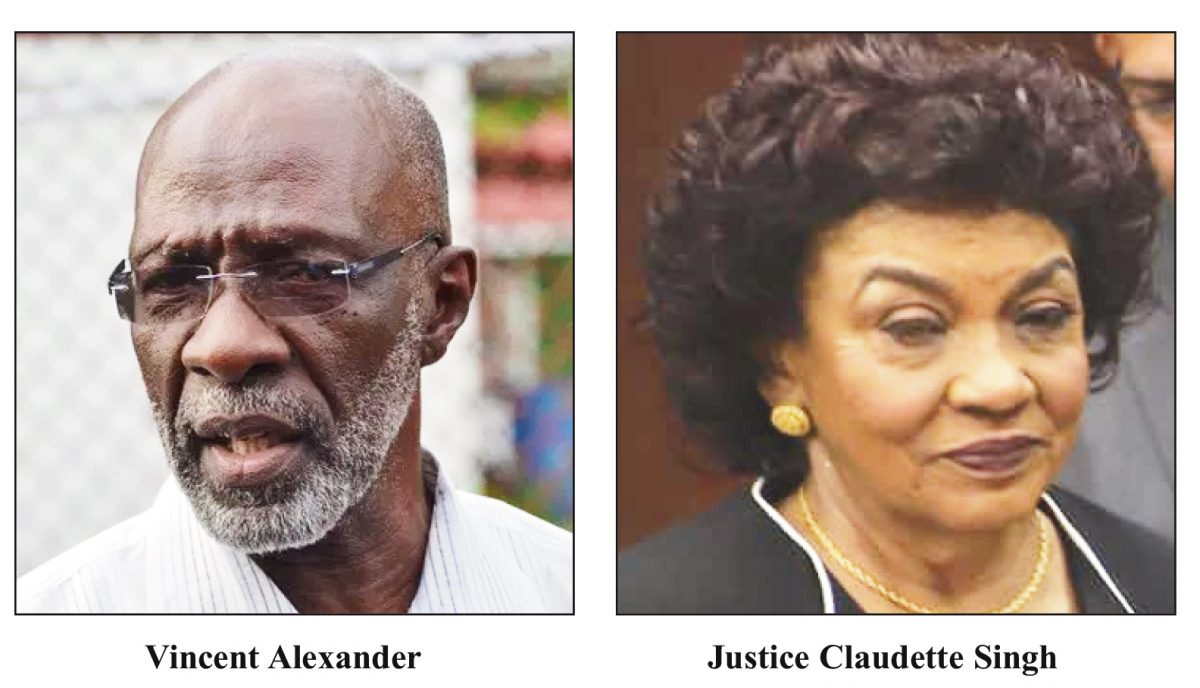Responding to claims by Chair of the Guyana Elections Commission (GECOM) retired Justice Claudette Singh that her decisions are grounded in the law, Opposition Com-missioner Vincent Alexander has said that she has misconceived the nature of the body, which can go beyond interpreting and making decisions based on the law.
As a result, Alexander is arguing that the Chair cannot even claim the right to make decisions based on the “prepared statements” she has delivered in the past.
“To wit, when pronouncing on the decision of the Commission, her prepared statements cannot be treated as rulings based on law. They can only be considered as her vote on the matter, at hand. She, therefore, cannot even claim the right to make decisions,” Alexander wrote in a letter to the editor of this newspaper.
The Opposition Com-missioners have accused Singh of always voting in favour of the government.
Last week, during a rare engagement with the media, Justice Singh said that the criticisms against her are always going to be there despite what side she supports. “…anything I do in accordance with the law. And I try, as a former judge, I always try to uphold the rule of law. But there will be criticisms. If you sit on the bench and you make an adverse decision, the party who loses would say you’re biased you take a bribe, whatever. But that’s it. So there’s always a way you can criticise a decision. That’s up to them,” she had said.
In the letter, published in Monday’s edition of Stabroek News, Alexander said that Justice Singh has a misconceived nature of GECOM, noting that the commission is a constitutional body, which is tasked with the administrative responsibility for the conduct of free, fair and transparent elections in Guyana.
“GECOM`s operations are therefore not limited to interpreting, and making decisions based on, the law. Many of its decisions are not premised on any law, except for the procedural requirements such as the right to a hearing et al. While administration should be conducted within the framework of the rule of law, there is much more to it than merely adhering to the rule of law,” he explained.
The veteran Commissioner added that the intended goals of the administrative process can be undermined if the “purpose and suitability” factors are not taken into consideration with making decisions. Alexander added that there are many instances where he believes the Chair has misinterpreted or misapplied the law.
Pointing to Justice Singh’s recent decision to rule against a proposal that an internal investigation be launched into the events of the March 2020 general and regional elections, Alexander said the denial of that request stands out as an example of misapplication and misinterpretation of the law, to wit the Consti-tution of Guyana.
In her written decision striking down the first motion, the Chair proffered that “GECOM is not a court of law and therefore has no authority to determine whether an election was lawfully conducted, and no such power was conferred on it under Article 162 (1) (b). A perusal of Articles 162 and 163 shows that the Constitution clearly and sharply separates the functions of GECOM and the High Court respectively in matters of electoral laws. “The Commission does not have, and cannot clothe itself with, the powers of a Court of Law to examine and re-examine witnesses or to procure official documents to determine the truth of the allegations contained therein. Any such question can only be determined by way of an election petition filed in the High Court.”
Addressing the decision, Alexander, in his letter, argued that the Chair only cited a few of the nine clauses of the motion which amounted to her not examining the entirety of the motion. He added that she did not respond to the resolve clauses, which were aimed at examining the functionality of GECOM’s systems.
“The whereas clauses, in no way or fashion collide with the jurisdiction of the High Court. While, the High Court is intended to focus on the impact of certain acts on the results. The motion focuses on whether the system is deficient and requires rectification,” he said.
Alexander reminded that Article 162(1) of the Constitution states “[GECOM] shall issue such instructions and take such action as appear to it necessary or expedient to ensure impartiality, fairness and compliance with the provisions of this Constitution or any Act of Parliament on the part of persons exercising powers or performing duties connected with or relating to the matters aforesaid”. He said that the Opposition’s motion was crafted with that provision in mind.
“The constitutional provisions, in my humble opinion, were clearly misinterpreted and misapplied. GECOM in any circumstance should be reviewing its operations from an evaluative perspective based on best practices, in management, with the aim of enhancing its operations, as was called for by the motion. GECOM has previously done this in its spheres of Human Resources Management and Information Technology,” he posited.
Following the 2020 general and regional elections, the Opposition has been calling for Justice Singh to resign. The calls came following a failed bid to rig the elections.
At his weekly press conference on Tuesday, Leader of the Opposition Aubrey Norton repeated that call, noting that the APNU+AFC has no confidence in the GECOM Chair. “We also believe the Chairman of the Guyana Elections Commission is biased and cannot be trusted to deliver free and fair elections,” he said.






